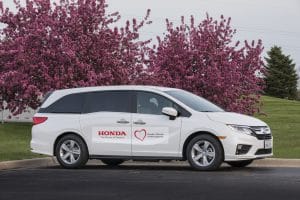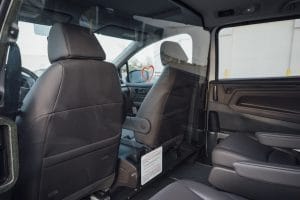
Honda engineers developed 10 specially outfitted Odyssey minivans to transport Detroit-area residents and healthcare workers to COVID-19 testing.
Honda is taking the battle against COVID-19 to the streets of the Motor City, delivering 10 specially outfitted Odyssey minivans to the City of Detroit to transport people potentially infected with COVID-19, as well as healthcare workers.
The vans are designed to protect the health of the driver from the potential for droplet infection during transportation of people who could be ill with COVID-19. The new vans are fitted with a plastic barrier installed behind the front seating area, as well as modifications to the ventilation system to maintain an air pressure differential between the front and rear seating areas.
The vans are a welcome resource in a city considered one of the nation’s hotspots for coronavirus and COVID-19 cases. The city has been battling not only to fight those infected, but to even simply get folks tested.
(Honda planning to show 2021 Odyssey at New York Auto Show.)
“As of today, the City of Detroit has tested over 20,000 residents and employees for COVID-19. Transportation is a critical component of ensuring every Detroiter has access to a test. We are very appreciative of Honda for choosing Detroit to deploy these newly modified vehicles,” said Mayor Mike Duggan, City of Detroit, in a statement.
A team of volunteer engineers were moved to action after seeing news reports about similar vehicles modified by Honda in Japan. When Detroit and Michigan officials approached American Honda in mid-April about the possibility of acquiring similar vehicles for use in transporting local residents and healthcare workers to COVID-19 testing, the group was ready.

Inspired by a similar effort in Japan, Honda engineers in Ohio developed these minivans in two weeks.
To make the vehicles safe, engineers installed a sealed clear polycarbonate (plastic) panel between the front seat compartment and rear two-row seating area. They had to remove the hand grips on the B-pillar, behind the first row, and replace them with new brackets to attach the clear panel. A second attachment bracket was fabricated and attached to the lower front seat belt anchor point for a total of three secure attachments on each side.
In addition to the clear polycarbonate barrier, the Odyssey’s ventilation system software was tuned to maintain a more positive pressure zone within the front compartment to establish a designed air pressure differential between the front and rear seating areas, greatly reducing the potential for droplet infection migration during transportation.
Honda R&D engineers in Ohio designed the software that controls the ventilation system on the current-generation Odyssey, giving them the knowledge to tune the software to assure the air pressure differential is compliant with guidelines established by the Centers for Disease Control and Prevention (CDC) for negative pressure rooms in medical and research facilities.
(Honda grows CR-V line-up for 2020 with new hybrid.)
To achieve this the blower motor powering the fans in the front seating area runs faster than the fans for the rear seating area. The resulting air pressure differential creates a more negative pressure chamber in the rear seating area, with rear compartment air exhausted out the vents in the rear of the vehicle.
The volunteers, who worked at Honda’s R&D center in Raymond, Ohio, including senior engineers and fabrication experts, quickly conceived and designed a method to modify the U.S. Odyssey.

Engineers protect the driver of the van from droplet infection migration by creating an air pressure imbalance in the minivan.
The team of Honda engineers and experts in Ohio took the project from initial concept to completion in less than two weeks. All material fabrication and installation, and adjustments to the software for the Odyssey’s ventilation system, was done entirely in-house.
“We’re very proud of the efforts made by Honda engineers in Ohio to quickly devise a plan and modify a small fleet of Honda Odyssey minivans to support the people of Detroit in the face of this unprecedented global pandemic,” said Rick Schostek, executive vice president of American Honda Motor Co., Inc.
“This project is one of many initiatives being undertaken by Honda and our associates to support communities throughout the country during this very difficult time.”
(Honda powers up with improved Civic Type R.)
The Odyssey minivan modified in Japan is a smaller vehicle than the eight-seat U.S. version of the Honda Odyssey that was designed, developed and engineered in the U.S. and is made exclusively at a Honda plant in Lincoln, Alabama.
